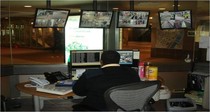BPR for CCTV and Monitoring Personnel
Traditional anti-crime CCTV application is based on the concept of evidence collection that can serve in investigating a crime after it has been committed. It is designed to collect and record evidence that may lead to understanding the event, to identify the criminal (s), and to provide information that could lead to arrest of the suspect (s).
CCTV evidence may also play a key role in court.
Traditional CCTV application is also aimed at deterrence of crime, posing a threat to the criminal by putting the person at risk of being identified, and by providing hard evidence that could be used against him in court.
In other terms, traditional anti-crime application is mostly responsive, with the only preventive (deterring) aspect driven by the threat of providing post-event evidence.
This approach has proved to be relatively effective for the purpose of crime fighting. It is almost completely ineffective and even irrelevant when it comes to fighting terrorists.
Terrorists, at the time of attack, are not affected by presence of any “post mortem” measures. Once the attack has been committed, the terrorist has achieved his or her goal. The damage in life, property, economical and political assets has been achieved, and there is no way to roll it back. In most cases, the issue of identification and detention of suspects is completely irrelevant, as the attack involves suicidal tactics.
Once it is understood that fighting terrorists is mostly about prevention, and that presence of cameras does not provide substantial deterrence, we must come up with solutions that will turn our CCTV systems into a prevention tool. BPR for CCTV users was developed in order to solve this need.
BPR methodology has gained substantial record of success in airports and rail systems, detecting individuals with malicious intent by using behavior indicators followed by further real-time, pro-active investigative techniques to substantiate or resolve the suspicion. Law enforcement officers in the US, as well as in the U.K., have been working with BPR for the last 5 years -- reducing crime and generating a strong deterrence factor.



